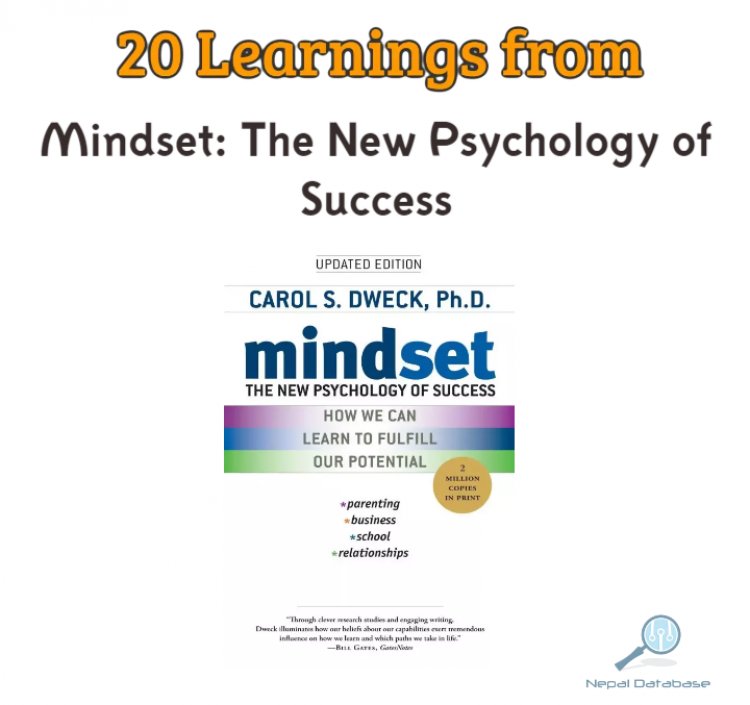20 Key Learnings from Mindset: The New Psychology of Success
"Mindset: The New Psychology of Success" is a book that explores the concept of mindset and how it can impact success and fulfillment in various areas of life.

"Mindset: The New Psychology of Success" is a book written by Carol S. Dweck, a renowned Stanford University psychologist. The book explores the concept of mindset and how it can impact success and fulfillment in various areas of life. The book presents the idea that people's mindset, whether fixed or growing, play a critical role in how they approach challenges, learn new information, and respond to failure. The book is based on decades of research in the field of psychology and offers practical insights and strategies for developing a growth mindset to achieve success and fulfillment. The book has become a classic in the field of personal development and has been widely praised for its ability to change the way people think about their own abilities, and how they approach challenges and setbacks. Here are 20 important learnings from this book:
-
The Importance of a Growth Mindset
The book emphasizes that having a growth mindset, where one believes that abilities and characteristics can be developed through effort and learning, leads to greater success and fulfillment in life. -
The Power of Effort
The book argues that effort and hard work are key factors in achieving success and that talent alone is not enough. -
Overcoming Adversity
The book suggests that by learning to persevere and overcome challenges, one can develop resilience and the ability to bounce back from setbacks. -
The Role of Failure
The book highlights that failure is an important part of the learning process and that by learning from our failures, we can improve and ultimately achieve success. -
The Importance of a Positive Attitude
The book suggests that a positive attitude can help to increase motivation, overcome challenges, and improve overall well-being. -
The Power of Believing in Yourself
The book emphasizes that by believing in your own abilities and potential, you can unlock your full potential and achieve success in all areas of life. -
The Importance of a Support System
The book stresses the importance of having a support system of people who believe in you and your goals, providing the encouragement and motivation needed to achieve success. -
The Role of Self-Reflection
The book highlights the importance of self-reflection in understanding one's own abilities, challenges, and motivations, in order to improve and achieve success. -
The Importance of Practicing
The book suggests that consistent practice and hard work can lead to mastery and excellence in a field. -
The Importance of Embracing Challenges
The book suggests that challenges are opportunities for growth and learning, and embracing them can lead to personal and professional development. -
The Importance of a Learning Orientation
The book suggests that having a learning orientation, where one is open to new experiences, feedback, and learning, is more beneficial than having a performance orientation, where one is focused on proving oneself. -
The Role of Mindset in Goal-Setting
The book argues that having a growth mindset can help in setting and achieving more challenging goals, as one believes that abilities and characteristics can be developed. -
The Role of Mindset in Resilience
The book suggests that having a growth mindset can help in developing resilience and bouncing back from failures and setbacks. -
The Importance of Mindset in Creativity
The book suggests that having a growth mindset can help foster creativity and help one embrace new ideas. -
The Role of Mindset in Leadership
The book argues that having a growth mindset is important for effective leadership, as it allows leaders to be open to new ideas, learning, and feedback, and lead their team in a way that fosters growth and development. -
The Importance of Mindset in Parenting
The book suggests that having a growth mindset can help parents raise children who are more resilient, self-motivated, curious, and have a greater sense of control over their lives and future. -
The Role of Mindset in Sports
The book suggests that having a growth mindset can help in achieving excellence in sports and in overcoming challenges and setbacks. -
The Importance of Mindset in Education
The book argues that having a growth mindset can help promote a love of learning, and foster a learning environment that encourages curiosity, experimentation, and risk-taking. -
The Role of Mindset in Relationship
The book suggests that having a growth mindset can help foster healthy and meaningful relationships, by being open to learning and personal growth. -
The Importance of Mindset in Health
The book suggests that having a growth mindset can help in promoting a healthy lifestyle, and in overcoming challenges and setbacks related to health and wellness.
What's Your Reaction?





































































































